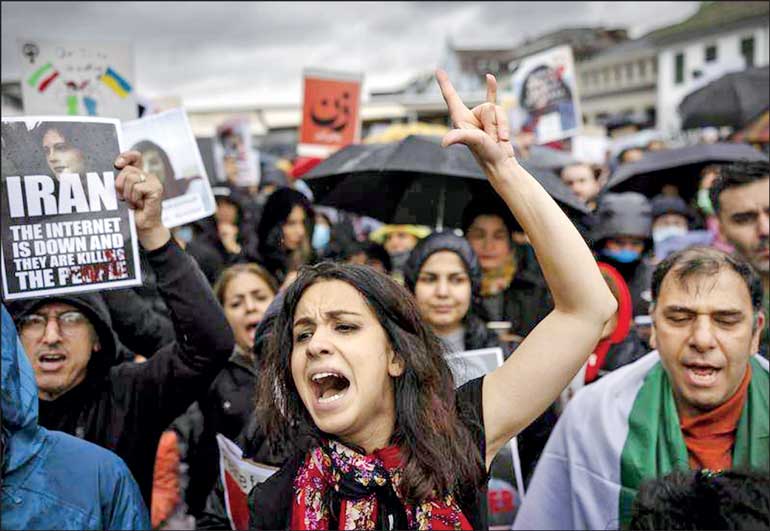Monday Feb 16, 2026
Monday Feb 16, 2026
Saturday, 3 December 2022 00:00 - - {{hitsCtrl.values.hits}}

By Dammika Adhikari
Iran became an Islamic republic in 1979 when the monarchy was overthrown and clerics assumed political control under supreme leader Ayatollah Khomeini. Iran occupies a land area of 1.64 million square kilometres and provides space for more than 89 million people.
At a strategic location of west Asia, Iran bordered from the west with its economically unstable Iraq and NATO member country Turkey, Azerbaijan, and Armenia to the Northwest which had a war between disputed land over Naganoka Krabak, the Caspian Sea, and Turkmenistan to the north, Afghanistan, and Pakistan to the east, and dominating strategically important sea lane of communications in the Gulf of Oman and the Persian Gulf to the south. Iran has been occupying diverse religions and ethnic groups in the country. The Muslim religion is the main religion in the country and 90% of the Muslims belongs to the Shia Muslim community while 10% belongs to the Sunni Muslim community.
In the early 1980s, during the cold war, both Iran and Iraq were aligned with two power blocks. The war between Iran and Iraq in 1980-1989 over the conflict over the Shatt al-Arab waterway ended with devastating results for both parties. The autocratic regime of Iran has been governed through strict enforcement of Islamic laws for decades. The end of the war between the two countries was created for both countries to commence total restructuring of their statecraft. The capacity and capability of Iran’s armed forces have been developed gradually to meet the threats emerging from internally and externally. Accordingly, land, air, and navy have been equipped with modern technology even though they are isolated in the global order.
Presently, Iran has been developing unarmed aerial vehicles, development of Ballistic missiles, space programs, and nuclear programs to counter its traditional rivals. This transformation program has included highly reliable and trained Republican guards employed to face any kind of threats emerging internally and externally. However, these republican guards are engaging in several proxy wars in various countries in the region such as Iraq, Syria, and Yemen. The killing of General Quessem Soleimani in Baghdad is a classic example of Iran’s involvement in internal matters with its neighbours. The defence budget has been increasing gradually every year. However, in the year 2022 Iran spent $ 12.5 billion on the armed forces.
There were some peaceful protests that erupted against this Iranian regime in the past few decades. Some student groups protested against the government in the early 1990s criticising the government’s strict implementation of Sharia law and very low economic conditions. All these protests were cracked down by the Iranian security forces even without considering the strong criticism from the international community. Iran has been expanding its sphere of influence to its neighbouring countries as well as maintaining constant surveillance of its rival countries. Several surveillance assets were deployed to ensure constant surveillance of these countries.
Strict enforcement of sharia law has been ensured by the morality police and the cyber domain has been curtailed to a certain extent to ensure to maintain a strict grip over the population to prevent any external interferences. Several terrorist attacks were reported in the last few years bordering provinces in Pakistan, and Iraq. ISIS, Taliban, and Sunni terrorist organisations are behind these sabotage activities.
The killing of Maska Ammi on 16 September 22, a young lady from Mahabad city, who died during the custody of the Morality police of Tehran has sparked several clashes in Teheran, Mahabad, Bench, and Sanandaj cities where the majority of the Kurdish population are occupying and southeast city of Baluchistan. Accordingly, more protests have erupted with the leadership of ladies against police brutality and government policies in the country. Another part of the country has raised against these brutal activities.
The protest has been continuing for more than five weeks and more than 14,000 people have been arrested, more than 434 people (this includes 60 children) died, and more than 20 people executed under the direction of Islamic sharia law. More significantly, the United Nation Human Rights Council is going to implement a resolution against Iran on human rights violations, unnecessary detention of people, and extensive use of force.
During the 1979 revolution, the Kurdish population was standing with social changes and accepted the religious regime. However, for more than 40 years Iran has been ruling based on religious fundamentals. The present developments have created an internal environment more unfavourable for the present government after three decades. This anti-government protest could have been exploited by external parties to create the environment to commence the “Arab spring” which we witnessed in the year 2011.
A crackdown on peaceful protests using lethal force could spread this violence and anti-government protests to the entire region which might severely affect the power balance of the region. The ongoing offensive operations against the Kurdish militia in the northern region of Turkey have impacted to obtain popular support for the Kurdish population from bordering regions. However, more Western powers have highly criticised the ongoing human rights violations and cracked down on Iran.
Destabilising and change of regimes is one of the key intentions of Western power to have peace in the full Middle East and ensure to have sound power balance and prevent proxy wars in the region. Further, this could have a critical impact on the energy sector. The potential capability of Iran cannot be unpredictable due to its present military capabilities and nuclear ambitions. This might have a critical impact on regional power balance and peace and the environment of the region.
(The writer has Bachelors and Masters in security and strategic studies from the General Sir John Kotelawla Defense University and experience in discussing international relations at various levels for over 10 years.)